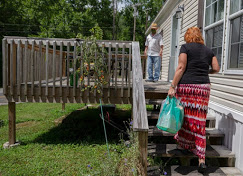Kenning went to Bell and Harlan counties in the southeast corner of Kentucky, which recently recorded some of the state’s highest increases in average daily cases per person.
“Bell went from 20 cases to more than 200 in two weeks. Harlan saw 85 in a single week, twice as many as it had over four months. Bell, Clay, Knox and Harlan counties combined, for example, saw deaths more than triple to 18 in the month ending July 30,” he reports.
“We were one of the last counties to see any cases,” Trissa Wilder, nurse supervisor for the Bell County Health Department, told Kenning. “We got lax, feeling that we were safe and secure” because of Central Appalachia’s geographic isolation.
Officials across several Kentucky Appalachian counties told Kenning that the virus first spread from “Carolina beach trips, Fourth of July parties, weddings, football practices, a four-day church revival — and even an illegal Clay County cockfight,” he reports.
Health officials have voiced concern that covid-19 will have a disproportionate impact on Appalachia because it has fewer hospitals and intensive-care beds, high rates of poverty and conditions such as diabetes and heart and lung disease that make people more vulnerable to the virus.
“All that has meant special challenges for health departments hollowed out by budget cuts, such as those in Bell County, which battle distance, poverty, spotty cellphone coverage, neglected health, difficulty getting some residents to testing and distrust amid the growing politicization of public health,” Kenning reports.
In addition to their ongoing daily work to keep a community safe, public health departments have been stretched even thinner as they have increased their their contact-tracing efforts to identify those who have been infected, then tracking down everyone they have come into contact with and asking them to self-quarantine.
The state has provided some relief on this front by expanding the number of tracers with federal coroanavirus money, “even as the effort’s effectiveness wanes as cases increase,” Kenning reports. The state says it recently added 455 tracers to the 431 who were already doing this job, and so far, the tracing is keeping up with the demand.
That added help is critical, Kenning reports, since the number of public-health workers in Kentucky has fallen 34% since 2012, according to the Kentucky Center for Economic Policy.
“We’ve got a small health department, and we did get a little overwhelmed,” Harlan County Judge-Executive Albey Brock told Kenning. “Contact tracing is no joke. It’s laborious. They keep daily communication. If we have 104 active cases, they each have to be called every day. That’s on top of having to track down people they’ve had contact with, getting them a letter, let them know to quarantine.
And then there’s the politics. Kenning writes from the Bell County seat of Pineville, “The area remains a conservative place, where every elected official but one constable is Republican. When cases were slow to materialize, some found it easy to dismiss alarms over the coronavirus as a Democratic plot to make President Donald Trump look bad or infringe on rights by requiring masks, local residents and officials said.”
In Harlan, about 30 miles up the Cumberland River from Pineville, Brock, a Republican, told Kenning that he has attempted to depoliticize the pandemic by sending public-health messages via social media and radio and having stern talks.
“We’ve tried real hard locally to stamp that down. If you want to fight with Trump or Biden, have at it. Just wear a mask,” he said, adding jokingly, “Some believe we never walked on the moon, so I can’t help them.”
Since Gov. Andy Beshear mandated masks and Walmart required face coverings, mask use has “gone up dramatically,” which has been “a pleasant surprise,” Ben Barnett, Bell County’s Emergency Management director, told Kenning.
Christie Green, public health director for the Cumberland Valley District Health Department. which overs Clay, Jackson and Rockcastle counties, told Kenning that contact tracing has thwarted the spread of the virus in several cases. “But she’s still fighting distrust of public health fueled by national politics.” She said, “People don’t know what to trust or believe. . . . How do you parse out all the soundbites you get?”

